Newsletter
Weibo Watch: Ghost Scales
From national pride to social distrust, these are the most noteworthy trends and topics dominating Chinese social media recently.
Published
6 months agoon

PREMIUM NEWSLETTER | ISSUE #18
This week’s newsletter:
◼︎ 1. Editor’s Note – Ghost Scales
◼︎ 2. What’s Featured – A closer look at the featured stories
◼︎ 3. What More to Know – Highlighting 8 hot topics
◼︎ 4. What Lies Behind – Observations beyond the headlines, by Miranda Barnes
◼︎ 5. What’s Noteworthy – Lu Xun turning in his grave?
◼︎ 6. What’s Popular – China’s very own ‘pride walk’
◼︎ 7. What’s Memorable – The school in Changzhou that made students ill
◼︎ 8. Weibo Word of the Week – “Toxic Fangirling”, by Ruixin Zhang
Dear Reader,
‘Ghost scales’ have been all the talk on Weibo lately. The term, guǐ chèng (鬼秤), refers to inaccurate scales used to cheat customers by providing less than the actual quantity for the price paid.
The topic of ghost scales came up when a well-known Chinese blogger recently exposed how many sellers in Dalian markets were actually using deceptive weighing scales, duping ordinary customers buying their vegetables, fruit, or seafood. On Weibo alone, one related hashtag page garnered nearly 250 million views.
Despite local authorities stepping up to investigate and punish fraudulent sellers tampering with scales, the incident ignited anger beyond Dalian. People questioned why it took an internet influencer to advocate for consumer rights and why there aren’t better regulations in place to combat fraud. Rather than blaming the fraudulent sellers, online anger was mostly directed at the systems allowing them to operate.
The ghost scale story does not stand by itself. Much smaller stories have gone viral before, such as the customer who discovered that the 200g of tripe he ordered for 72rmb ($11) at a local Haidilao restaurant was actually only 138g. A related hashtag received over 260 million views on Weibo in 2021. “Next time I’m bringing my own scale,” some commenters replied.

The vlogger, superB太, exposing the fraudulent scales in Dalian.
Is it much ado about nothing? Not really. Although the stories differ, the common theme behind many of these online discussions is distrust. Recently, various topics highlighting low societal trust have trended.
One revolved around the Heilongjiang gym collapse. Three Chinese middle school students died in November when their gymnasium roof collapsed after heavy snowfall. It was the second gym collapse incident in the province this year. Netizens argued that better inspections, quality checks, and stricter public safety regulations could have prevented the tragedy.
Another example is the recent controversy about fake birthing certificates being sold by a hospital in Xiangyang for use by human trafficking brokers. The head of the hospital and five others were soon detained after the story, exposed by a Chinese investigative vlogger, went viral. Many questioned how such a thing could still happen in 2023.
The recurring idea in these online discussions is that existing constructions at various levels in Chinese society allow such practices to happen, with people supposedly covering for each other and turning a blind eye during inspections. While a market might have actual ‘ghost scales,’ similar deceptive operations could occur at a hospital management level, at a construction site, or within a coal mine company.
A few years ago, the development of China’s Social Credit System was often portrayed as a gloomy sci-fi storyline by many Western media outlets. Even today, there are many people who think that China has a system in place as depicted in the American Black Mirror series, which shows a dystopian society where people are judged by a numeric rating given to them by their interactions with other people.
Many people and media outlets not only misunderstood the Chinese ‘Social Credit System’; they also overlooked the historical, social, and culturally rooted factors that play a crucial role in understanding how such a system, designed to enhance societal trust, could actually be embraced. (For accurate and nuanced perspectives on the social credit system, Vincent Brussee has just published a new book that delves into these complexities.)

In the Black Mirror episode ‘Nosedive’, people’s position on the social ladder is determined by other people ranking them.
In making a distinction between ‘high-trust societies’ and ‘low-trust societies,’ Francis Fukuyama (1995) classified China as a ‘low trust society,’ where people have very little trust in people outside their family or close groups. Though not everyone agrees with Fukuyama, the idea of being cheated or becoming a victim of fraudulent practices regularly trends on China’s internet. Small incidents represent more significant issues.
After the Dalian ghost scale incident went viral, multiple people took the initiative to test scales in their own neighborhoods. A student from Henan University, a livestreamer from Shenyang, a reporter from Nanchang—each contributed to exposing local street vendors or restaurant owners using ghost scales to cheat customers.
The domino effect of ghost scales being exposed demonstrates the powerful dynamic of Chinese social media. Untrustworthy individuals lacking integrity can be swiftly exposed, and their fraudulent businesses crumble within hours. Chinese influencers, vloggers, and commentators play a major role in addressing various social issues, from scamming sellers to corrupt doctors, and actually make a change.
Some netizens recently commented that their local market sellers would not dare to use ghost scales anymore. In the meantime, however, while the fight for consumer rights and social injustice continues, it could never hurt to bring your own trustworthy scale.
Miranda Barnes and Ruixin Zhang have contributed to this week’s newsletter.
Best,
Manya (@manyapan)
* Francis Fukuyama. 1995. Trust: The Social Virtues and the Creation of Prosperity. New York: Free Press
What’s Trending
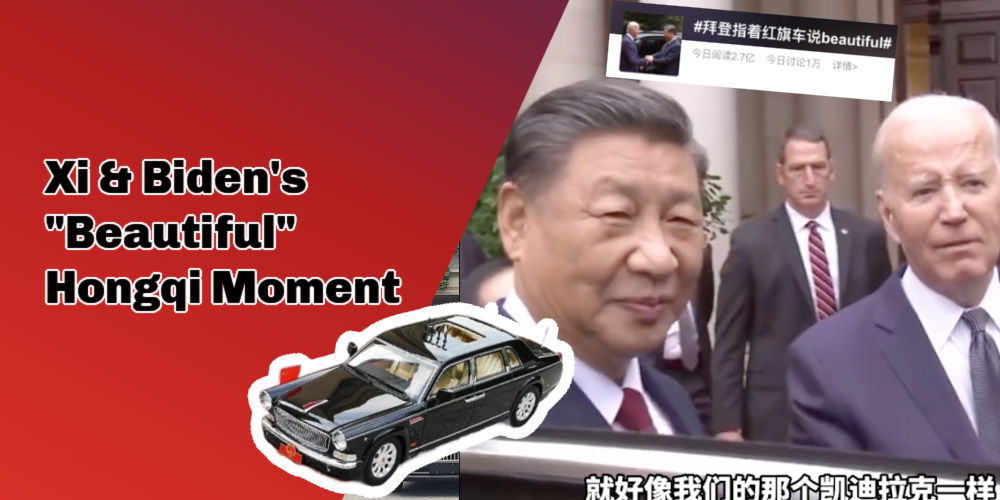
1: National Pride and Shifting Dynamics in Sino-American Relations | The Xi-Biden meeting was one of the biggest topics of the week. After the much anticipated face-to-face talk in California, one noteworthy detail quickly hit Weibo’s top trending topics, namely Biden’s apparent admiration for Xi Jinping’s Hongqi car. The recognition of the decades-old Chinese Hongqi brand by a U.S. president was a promotion-worthy moment for Chinese official channels, resonating with netizens.
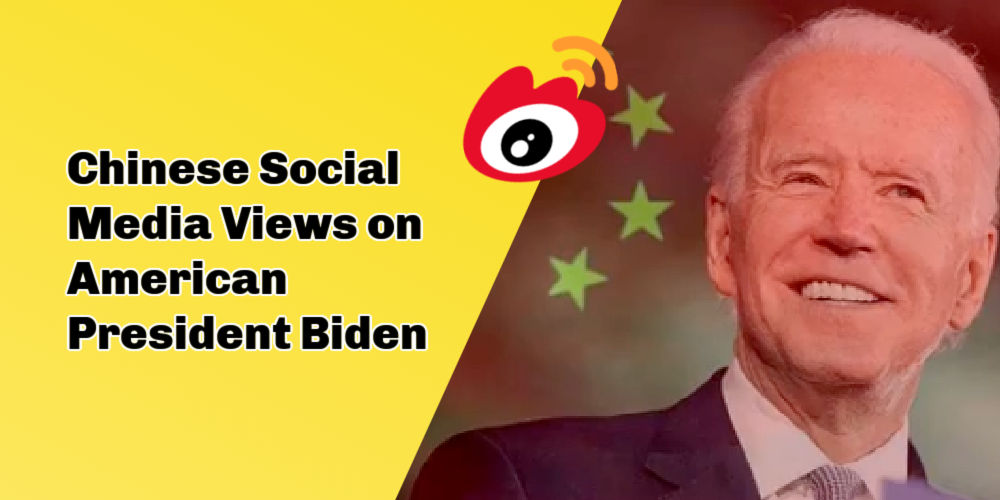
2: ‘Sleepy Joe’ and ‘Revive the Country’ Biden | From positive portrayals by official channels to online banter and critical voices discussing Biden’s global policies and his health, there are various sentiments on Chinese social media surrounding US President Joe Biden. At a time when anti-American sentiments are on the rise, some netizens view Biden as embodying the negative stereotypes prevalent on social media about the United States or the Western world in general. But in the days leading up the Xi-Biden meeting Chinese official channels are promoting more positive portrayals of the U.S. leader.

3: The Sun-Yat Sen Hospital Controversy | Several medical workers who all worked at the same renowned oncology lab in Guangzhou recently were diagnosed with cancer. Although there are many concerns about whether or not their cancer is related to their working environment, the primary source of public outrage revolves around the handling of the controversy by the affiliated hospital.

4: Douyin Introduces Paywalls | The introduction of a Douyin novel feature, that would enable content creators to impose a fee for accessing their short video content, has sparked discussions across Chinese social media. Although the feature would benefit creators, many Douyin users are skeptical. Would this be a new beginning for the Chinese TikTok, or would it be the end?
What More to Know
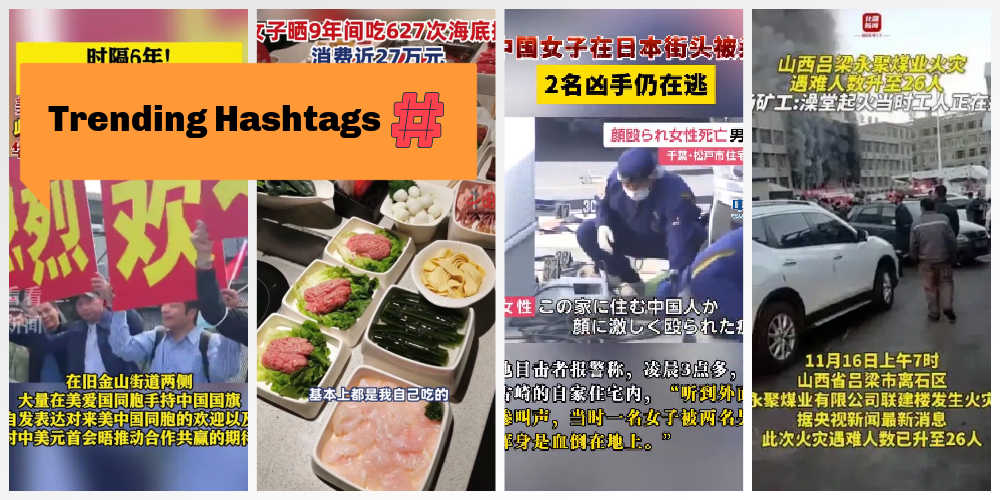
◼︎ 1. TAOBAO CRASHES DURING SINGLE’S DAY SALES | China’s largest online shopping event of the year, Single’s Day, took place on November 11 for the 15th time. Despite concerns over China’s economy, Chinese e-commerce giants Alibaba and JD.com once again saw record sales, although, similar to last year, they did not release their full results. One topic that generated enormous attention on the day itself was Taobao, Alibaba’s e-commerce platform, becoming unreachable before the end of the day, leaving millions of online shoppers clicking and refreshing as the platform kept crashing due to the surge in traffic. (Weibo hashtag “Taobao Down” #淘宝崩了#, 2.6 billion views).
◼︎ 2. SIMBA DOUYIN ACCOUNT BLOCKED | Earlier this month, Chinese famous Kuaishou livestreamer Simba (辛巴, real name Xin Youzhi) became a top trending topic after his Douyin account, where he had over four million followers, was banned. Although the official reason for his suspension was not explicitly stated, it reportedly related to the fact that Simba, among others, had scolded the Douyin platform. Simba, the king of Kuaishou, is known for getting into controversies and arguing with other livestreamers and companies. Now, he can add ‘arguing with platforms’ on his list as well. (Weibo hastag “Simba Douyin Account Banned” #辛巴抖音账号被封禁#, 390 million views).
◼︎ 3. MURDER IN MATSUDO | In the morning of November 9, Japanese police Matsudo discovered a woman covered in blood on the streets of the city’s Kogasaki district. She was later pronounced dead at the hospital. The woman was a 33-year-old Chinese national who reportedly resided in the Japanese city. She was fatally attacked and beaten by two men in the early hours of the morning and was left to die in the streets in a pool of blood. (Weibo hashtag “Chinese Woman Murdered on Streets in Japan” #一中国女子在日本街头被杀害#, 350 million views, read more here)
◼︎ 4. CHINESE CROWDS CHEERING IN SAN FRANCISCO | Apart from the Xi-Biden talks and APEC in general, what caught significant attention on Chinese social media this week was the enthusiastic reception of Xi Jinping by Chinese crowds in San Francisco. On November 14, the day of his arrival in the US, flag-waving crowds gathered along Xi Jinping’s route from the airport to the hotel. Chinese official media actively shared news about their presence, while protests critical of Xi and addressing human rights issues in China went unreported. In contrast, the pro-Palestine protests during APEC did receive media attention, highlighting a media bias in determining which public voices and flag-waving actions were deemed hashtag-worthy and which were silenced. (Weibo hashtag “Crowds of Chinese/Overseas Chinese Form Welcome Crowd in San Francisco,” #华人华侨在旧金山组成欢迎人群#, 170 million views.)
◼︎ 5. CHINESE INTERNET CELEBRITY DROWNS | News about a Chinese national drowning in Bali became top trending on Weibo on November 9 when it was revealed that the 34-year-old man was the popular Chinese influencer Jhony Huang (仲尼), also known as XFJ or Huang Xiaofeng (黄小沣). The tragic incident reportedly occurred when Huang was swept away by waves and struck by a large wooden object while swimming with his wife at Batu Belig Beach during their vacation. His wife, the Ukrainian Karina Melynychuk, was also hospitalized but did not sustain serious injuries. According to local reports, Huang’s lifeless body was discovered floating approximately 100 meters from the Petitenget Beach shoreline. (Weibo hashtag “34-Year-Old Chinese Male Drowns in Bali” #一名34岁中国男性在巴厘岛遇难#, 910 million views; “Jhony Drowns After Hit by a Large Log” #仲尼系遭大木头撞击溺亡#, 140 million views).
◼︎ 6. BIRTH CERTIFICATE SCANDAL | A hospital director and seven staff members are currently being investigated for reportedly selling counterfeit birth certificates for trafficked babies. The controversy emerged when a Chinese anti-human trafficking campaigner posted a video on Douyin, accusing Jianqiao Hospital in Xiangyang (襄阳健桥医院) of fabricating birth certificates and charging approximately 96,000 yuan ($13,165) for them. On social media, netizens expressed shock that such practices are still occurring in 2023, and there was surprise that the case was brought to light by a volunteer rather than being uncovered by authorities (Weibo hashtag “Xiangyang Announcement on Jianqiao Hospital Selling Birth Certificates Problems” #襄阳通报健桥医院贩卖出生证问题#, 27,8 million views).
◼︎ 7. FIRE IN SHANXI | A fire that broke out on the morning of November 16 in a coal firm office building in Lüliang, Shanxi province, claimed the lives of at least 26 people and resulted in 38 injuries. The blaze ignited in the four-story building containing offices and dormitories. The incident adds to a series of safety concerns in China’s coal industry – the building in question is affiliated with the Yongju Coal Group (永聚煤矿), a mayor player in the region’s coal mining sector. By now, 13 people related to the company, including executives, are facing criminal measures for their responsibility in the incident. (Weibo hashtag “Shanxi Yongju Coal Company Fire Claims 26 Lives” #山西永聚煤业火灾已致26人遇难#, 65 million views).
◼︎ 8. WOMAN SPENDS FORTUNE ON HOTPOT | A 32-year-old woman from Nanjing, China, grabbed attention on Weibo this weekend by revealing that she had spent nearly 270,000 yuan (over $37,400) at China’s renowned hotpot chain, Haidilao, in the past nine years. The hotpot enthusiast, named Kong, joined Haidilao as a member in 2014, and in that time, she indulged in over 627 hotpot dinners. Occasionally, her cravings led her to visit the restaurant more than 12 times a week, even enjoying hotpot for breakfast. (Weibo hashtag “32-Year-Old Woman Spent 270k at Haidilao in 9 Years” #32岁女子9年花费近27万吃海底捞#, 150 million views).
What Lies Behind

The Story of Li Jun and Liang Liang
In recent days, the challenges faced by an ordinary young Chinese couple who purchased an unfinished property have sparked extensive discussions on Chinese social media, shedding light on broader trends that lead some young people to seek an escape from the urban struggle and striving for a better everything (better housing, better jobs, better education) – they just want to “lie flat” (躺平) instead.
Last year, the couple, Li Jun (丽君) and Liang Liang (亮亮), first became popular on Chinese social media as they shared their journey of buying a property and building a life in Zhengzhou, Henan Province. They put a deposit on an off-planned apartment, eagerly anticipating its delivery in three years. Excited about their new home, they regularly updated their progress on Douyin, showcasing their savings efforts and monthly visits to the construction site.
However, after eight months, the developer faced financial issues, causing a halt in construction. In later videos, the couple appeared frustrated and disillusioned. Their daughter was born during this time, adding to the financial strain of rent and mortgage payments without a clear timeline for moving into their future home. Many others faced similar challenges. Authorities intervened, promising a delayed delivery. The initial contract included a 20,000 RMB ($2775) rebate for buyers, but the couple faced rejection and insults when demanding payment. In a recent altercation, the husband was beaten by developer personnel, and the wife’s phone was snatched as she tried to record the situation.
Their Douyin videos reflected the emotional rollercoaster of an ordinary Chinese couple facing setbacks despite following the traditional path of education, hard work, marriage, saving, property ownership, and starting a family. They are one of thousands of millions of ordinary Chinese people, who give their best effort despite all the struggles. Many were asking, would their life have been different if they had decided to ‘lie flat’ instead? And who is to blame for the fact that, despite all of their hard work and commitment, their ‘Chinese dream’ is taken away from them?
What’s Noteworthy
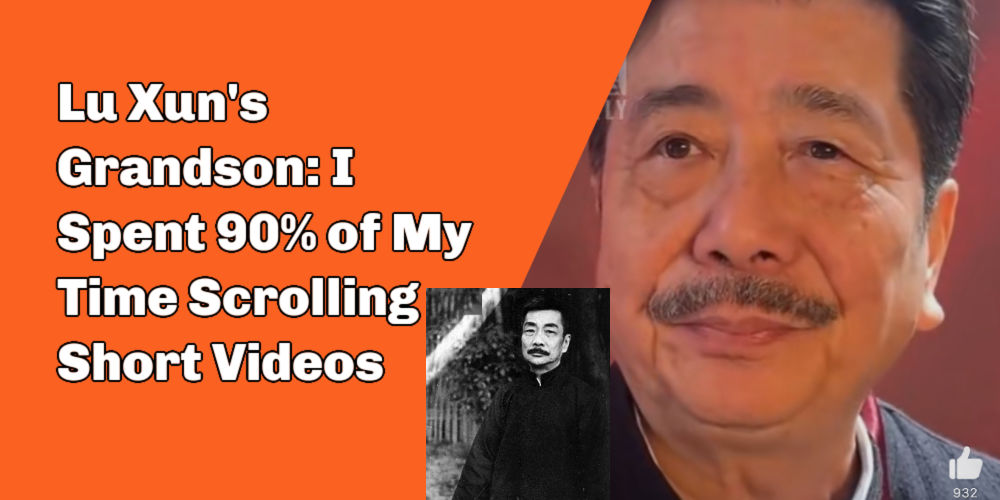
Lu Xun Turning in His Grave? | Lu Xun (魯迅, 1881-1936) stands out as one of China’s most notable and influential authors of the twentieth century. This esteemed Chinese writer, essayist, and literary critic unexpectedly found himself at the center of China’s social media discussions this week following an interview with his grandson, Zhou Lingfei (周令飞), during the Mao Dun Literature Award ceremony (茅盾文学奖) on November 17 in Wuzhen.
During the interview, Lu Xun’s grandson was asked about his online and reading habits. In a light-hearted response, Zhou humorously shared that he spends approximately 90% of his time watching short videos and 10% of his time reading books. A related hashtag (#鲁迅孙子自称90%刷视频10%看书#) went viral on Weibo, amassing over 190 million clicks.
The topic received so much interest due to various reasons. For one, as Lu Xun is widely regarded as the greatest Chinese writer of this century, people would expect his grandson to also be a man of literary knowledge and wisdom – they simply did not expect him to say he scrolls apps like Douyin and Kuaishou on a daily basis. Another reason is that it underscores a broader trend where people spend more and more hours on their phone mindlessly scrolling videos instead of engaging in study and learning. While some criticized Zhou for his comments, others also praised him for being authentic, straightforward and honest, just like his grandpa.
What’s Popular
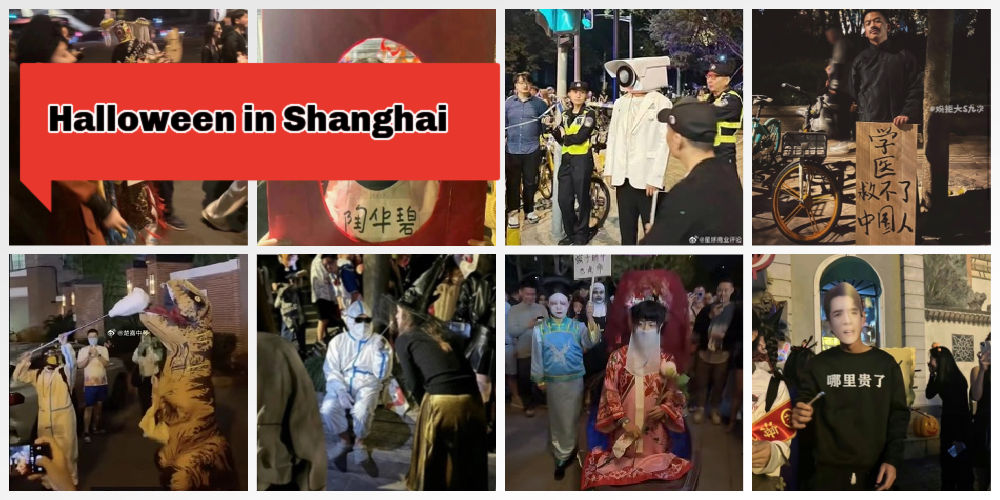
Halloween Outfits Reflecting Social Trends | Since our last newsletter was all about What’s on Weibo’s 10-Year Anniversary, we’d still like to take a moment to reflect on the celebration of Halloween in Shanghai this year as it caused a frenzy on the Internet.
Rather than traditional Halloween themes, young people on Shanghai’s Julu Road brought pop culture memes and social phenomena to life with their creative costumes. You could spot some dressed as the Lipstick King Li Jiaqi, who recently got caught up in controversy, or as “Dabai,” the anti-COVID workers in protective suits. This playful and unconventional celebration received praise from netizens across China.
The debate about whether or not people should be celebrating Western festivals often surfaces on Chinese social media during Halloween. However, the massive street party in Shanghai seemed to silence the critical voices this year. It appears that they reached a consensus; this Halloween celebration isn’t just about a Western festival, it’s an opportunity to let loose and express bottled-up emotions in a spooky and festive atmosphere. Whether dressed as writer Lu Xun making a statement or portraying a mobile surveillance camera, everyone found a haven for unrestrained self-expression. A comment under a photo recreating a scene from “Farewell My Concubine” captured the spirit: “Shanghai’s Halloween party has turned into China’s very own pride walk.”
With recent administrative rules turning Chinese New Year’s Eve into a regular workday, many young people express that they no longer care about a festival’s tradition and simply want to have some fun. One noteworthy viral video from Julu Road featured two guys dressing as legendary singers Feya Wong and Na Ying, performing a classic duet from the 1998 Spring Festival Gala. Netizens dubbed it the young generation’s Spring Festival Gala – a celebration of fun and creativity where happiness is the main focus.
What’s Memorable
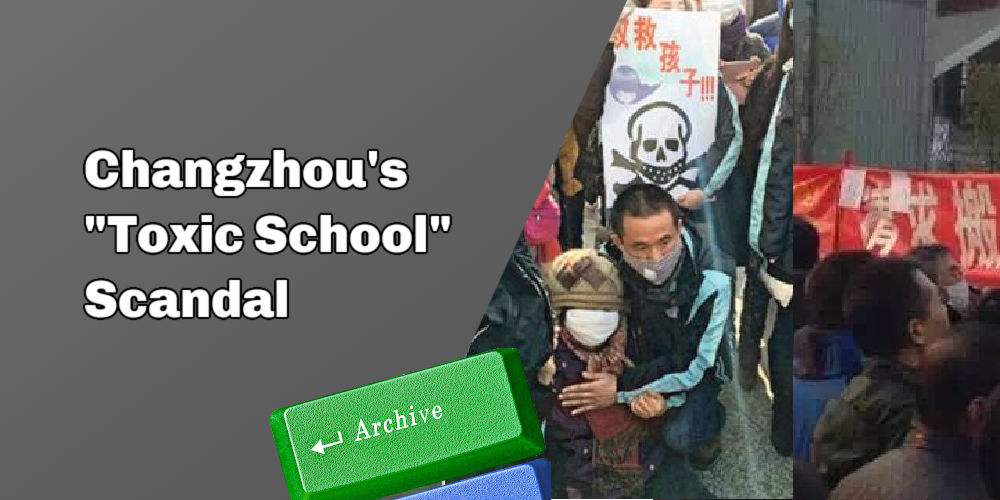
Changzhou Chemical Factory School Scandal | This week’s archival pick revisits a significant incident from eight years ago that fueled public distrust. In 2016, a major controversy unfolded around a middle school in Changzhou, where almost 500 students fell seriously ill, some diagnosed with leukemia. The health issues emerged after the school relocated to a new area near a chemical factory in September 2015.
Upon investigation, it was revealed that air and water pollution from nearby chemical plants was the cause. The news triggered widespread anger and discussions on social media, with netizens questioning the contrasting facts that emerged. The incident brought to light not only broader concerns about environmental safety and public health in China but also underscored a deep-seated distrust between parents and schools, citizens and local authorities, and netizens and official media.
Weibo Word of the Week
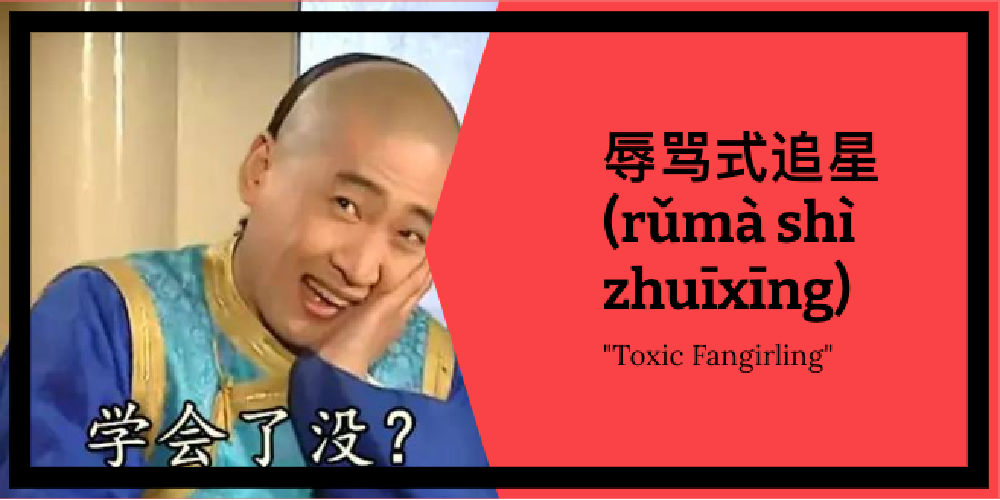
“Toxic Fangirling” | Our Weibo Word of the Week is “辱骂式追星” (rǔmà shì zhuīxīng), which translates to “toxic fangirling” or “toxically rooting for someone.”
In China’s ever-evolving fan culture, the phenomenon of ‘rǔmà shì zhuīxīng‘ (辱骂式追星, lit: ‘abusive-style celebrity admiration’) or toxically fangirling has recently become a trend. This term refers to a rather extreme way for fans to engage with their their idols. When pleased, they express intense love and support for their idols, but they can turn into abusive trolls targeting their idols when dissatisfied. This shift from love to aggression can be triggered by small things, like an unflattering photo or an unsatisfactory performance. Initially viewed as a departure from blind loyalty, this fan behavior has now turned somewhat toxic.
Recently, this term has sparked discussions likening this kind of online behavior to toxic parent-child relationships in Chinese society. The hashtag “Asian parents toxically rooting [for their children]” (#东亚父母辱追#) gained traction on Weibo. A top viral quote joked, ‘My parents toxically root for me every day; as long as they’re paying, they feel they can insult me all they want.’ These discussions touched upon the issue of how many Chinese parents seem to follow a strict and demanding parenting approach, where children need to adhere to high standards and are only praised or acknowledged when high standards are met. If this is not the case, parents will scold or discipline their children in the name of ‘love.’
Netizens interpret this ‘toxic fangirling’ phenomenon half ironically, half seriously, suggesting its origin may be rooted in the collective childhood trauma of Chinese fangirls. Similar to how a dragon-slaying warrior can become an evil dragon, traumatized children may choose to whip their loved ones into what they desire.
This is an on-site version of the Weibo Watch newsletter by What’s on Weibo. Missed last week’s newsletter? Find it here. If you are already subscribed to What’s on Weibo but are not yet receiving this newsletter in your inbox, please contact us directly to let us know.
Stories that are authored by the What's on Weibo Team are the stories that multiple authors contributed to. Please check the names at the end of the articles to see who the authors are.

Also Read
Featured
Weibo Watch: “Bloglator in the Era of Social Media”
By examining the influence of the “tragically ugly” schoolbook case, Bai demonstrates that WoW reporting had considerable impact on overall international media coverage.
Published
1 day agoon
May 19, 2024
PREMIUM NEWSLETTER | ISSUE #28
Dear Reader,
It’s been a little while since the last Weibo Watch newsletter. Those of you who follow me on X might already know that some personal circumstances have made it difficult for me to get a lot of work done this month following the unfortunate loss of two close family members and all the arrangements surrounding it. When it rains, it sometimes really does pour. However, life goes on, and I’m now ready to return to doing what I love most at What’s on Weibo. Thank you for your understanding as we dive back into the swing of things.
On that note, I am very happy to share some exciting news: my work at What’s on Weibo is the focus of a new study by Prof. Bai Liping (白立平) from the Department of Translation at Lingnan University (Hong Kong). The study, titled “Bloglator in the Era of Social Media: A Case Study of the Reports about the ‘Tragically Ugly’ Math Textbooks on What’s on Weibo,” has been published in Perspectives journal (2024, 1–16). You can find a link to the study here (limited free online copies available).
The study examines the role played by bloggers in the present-day news ecosystem, where social media has become increasingly important in various ways, making both news consumption and news production more multi-dimensional. In doing so, Bai zooms in on What’s on Weibo (WoW) as a prominent example of what he calls a ‘bloglator’: a blend of ‘blog’ and ‘translator’ to refer to someone who “translates, adapts, and recreates content from articles or posts on blogs, or does any translation on blogs” (3).
The research suggests that WoW’s work, reporting on trending topics on Chinese social media since 2013, constitutes a special form of news-related blog translation as well as blog-related news translation, carving out a special niche within journalistic translation and the broader news ecosystem.
Serving as a case study is an article published on the site in May 2022 about illustrations in a Chinese schoolbook series for children that triggered controversy on Weibo for their peculiar design and for being perceived as ‘aesthetically displeasing.’
The controversy began when concerned parents noted that the quality of the design in their kids’ math textbooks was ugly, unrefined, and overall weird.
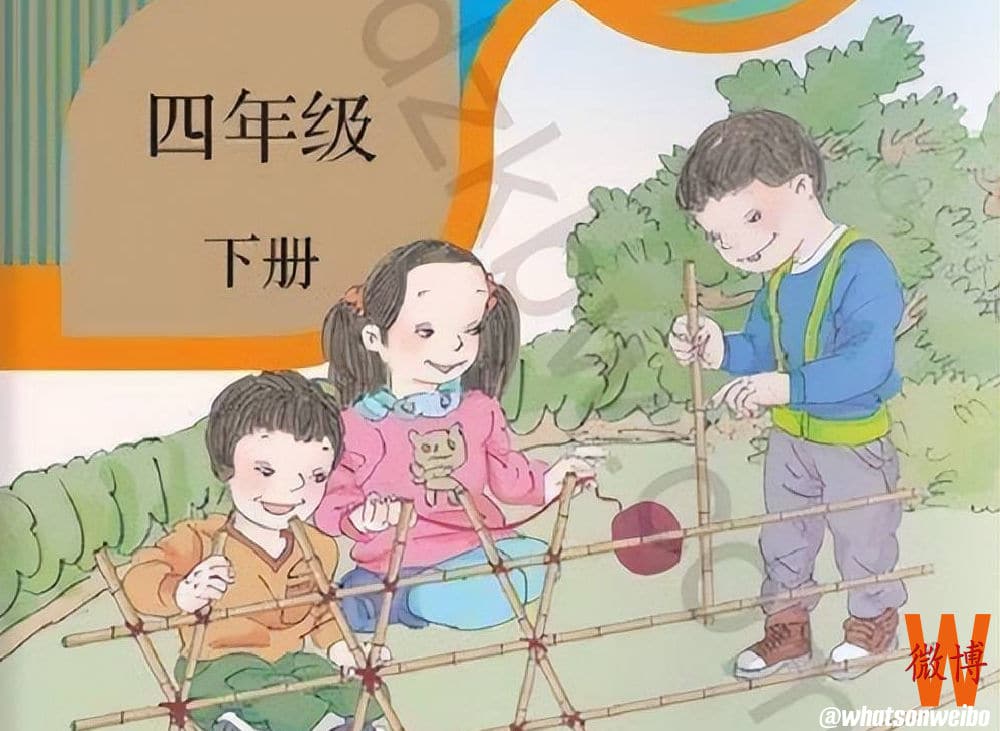
The controversial schoolbook.
Children depicted in the math book illustrations had small, droopy eyes and big foreheads. Besides the poor design quality, many people found some illustrations inappropriate: a girl sticking out her tongue, recurring depictions of American flag colors, an incorrect depiction of the Chinese flag, a bulge in the pants of depicted boys, and boys grabbing girls. These elements led many to believe the books had “evil intentions,” with parents expressing concern that these “tragically ugly” books could negatively impact children’s aesthetic appreciation.
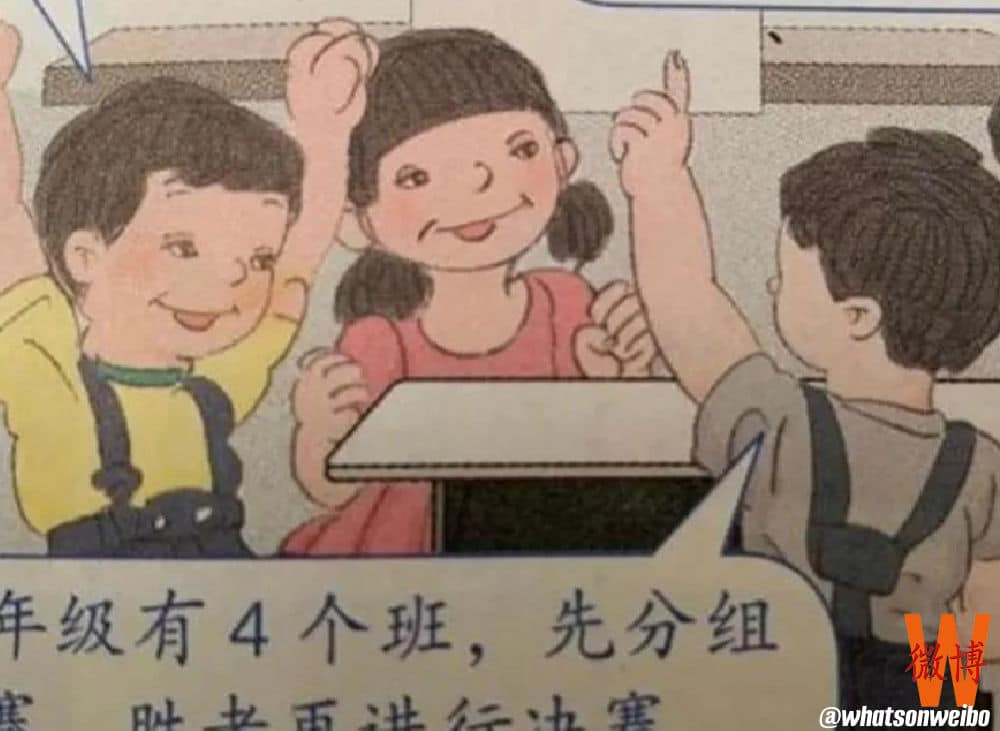


The explosive online discussions about the textbooks sparked a chain of events, covered in various articles here. Ultimately, it led to an official investigation by China’s Ministry of Education, holding 27 staff members accountable for their poor performance.
Among them were the Party Committee Secretary of the People’s Education Press, President Huang Qiang, who received a “serious warning” from the Party. Chief Editor Guo Ge was removed from office, along with others, including the head of the editorial office for elementary school mathematics textbooks. Illustrator Wu Yong and two other designers involved in the mathbooks reportedly will never work on national school textbooks or related projects again. The entire event was significant in various ways, also drawing increased attention to the quality of illustrations in teaching materials and shedding light on the dynamics behind Chinese schoolbook publications.
Bai’s study notes that WoW was among the first English websites to report on this topic, subsequently picked up by numerous other media outlets. While some sources, such as Australian news site news.com.au and The Guardian, included links or references to WoW, other news sites did not explicitly mention WoW but still used my translations, most notably the “tragically ugly” comment.
This non-literal translation of a Chinese phrase (most probably derived from 惨不忍睹 cǎn bù rěn dǔ “so horrible that one cannot bear to look at it”) exemplifies “translingual quoting,” a process where the original discourse is translated during quoting (6). You could consider it a ‘creative translation’ to convey meaning rather than exact words. As other reports also reproduced these exact words, it was evident what their source was. These two words ultimately became pivotal in the English coverage of the event; even today, a Google search directs you to this textbook controversy.
By examining the influence of the “tragically ugly” schoolbook case, Bai demonstrates that WoW reporting had considerable impact on the overall international media coverage of the event. It was cited by various English media outlets from Australia to the UK, from India to Hong Kong, including in traditional newspapers like The Independent, Sunday Times, and South China Morning Post.
He concludes:
“In the era of social media, just as Weibo has supplemented traditional media in the Chinese news ecosystem, WoW has filled a niche left by traditional media in the English news media ecosystem. Through WoW, readers can stay informed about the trending topics on Weibo, learn the views of the netizens and foster a deeper understanding of Chinese social and cultural life. The case study demonstrates that WoW’s reports about the tragically ugly math textbooks are consistent with its founder’s objectives of explaining the stories behind the hashtag and facilitating a better understanding of contemporary China, and that a ‘bloglator’ may play an important role in the evolving news ecosystem in this era of social media.”
Of course, I’m thrilled to see this finalized study on WoW’s impact in the news ecosystem. Beyond that, I value the term ‘bloglator,’ which aptly describes my role, and is different from the work done by journalists who translate news. It involves various strategies such as translingual quoting, providing explanations and background contexts, omitting irrelevant information, summarizing source texts, and most importantly, complete independence in choosing what to write about & the best way to cover it.
This independence enables WoW to spotlight interesting, noteworthy topics that help you stay connected to the Chinese social media sphere and its dynamics. As a subscriber, your support makes What’s on Weibo’s continuity possible. I look forward to working on many more topics in the future. Even the “tragically ugly” ones can sometimes turn out beautifully.
Best,
– Your ‘bloglator,’
Manya Koetse
(@manyapan)
References:
Bai, Liping. “Bloglator in the Era of Social Media: A Case Study of the Reports about the ‘Tragically Ugly’ Math Textbooks on What’s on Weibo.” Perspectives, (2024), 1–16. doi:10.1080/0907676X.2024.2343047.
What’s Been Trending

1: “Fat Cat Jumping Into the River Incident” (胖猫跳江事件) | The tragic story behind the recent suicide of a 21-year-old Chinese gamer nicknamed ‘Fat Cat’ has become a major topic of discussion on Chinese social media, touching upon broader societal issues from unfair gender dynamics to businesses taking advantage of grieving internet users. We explain the trend here👇🏼

2: TV show Triggers Nationalistic Sentiments | Forget about previous song competitions. Hunan TV’s ‘Singer 2024’ is all the talk these days. Besides memes and jokes, the show – which now invited notable foreign talent to compete against Chinese established performers – has set off a new wave of national pride in China’s music and performers on Chinese social media.

3: Storm over a Smoky Cup of Tea | Chinese tea brand LELECHA faced backlash for using the iconic literary figure Lu Xun to promote their “Smoky Oolong” milk tea, sparking controversy over the exploitation of his legacy. “Such blatant commercialization of Lu Xun, is there no bottom limit anymore?”, one Weibo user wrote. Another person commented: “If Lu Xun were still alive and knew he had become a tool for capitalists to make money, he’d probably scold you.”
This is an on-site version of the Weibo Watch newsletter by What’s on Weibo. Missed the last edition of our newsletter? Find it here. If you are already subscribed to What’s on Weibo but are not yet receiving this newsletter in your inbox, please contact us directly to let us know.
Featured
Weibo Watch: The Battle for the Bottom Bed
“The battle for the lower bunk beds” (“下铺之争”) is a reflection of society and generational difference in China, touching upon expectations regarding the respect younger individuals should show the elderly.
Published
4 weeks agoon
April 24, 2024
PREMIUM NEWSLETTER | ISSUE #27
This week’s newsletter:
◼︎ 1. Editor’s Note – Battle for the Bottom Bed
◼︎ 2. What’s Been Trending – A closer look at the featured stories
◼︎ 3. What More to Know – Five bit-sized trends
◼︎ 4. What’s the Drama – Top TV to watch
◼︎ 5. What’s Noteworthy – Zara x Haidilao
◼︎ 6. What’s Popular – Martin Garrix x Huang Zitao
◼︎ 7. What’s Memorable – Social media in times of flood
◼︎ 8. Weibo Word of the Week – Coffin rooms
Dear Reader,
Sometime around last summer, a significant debate about train etiquette began trending on Chinese social media. Central to the discussion was a question that attracted over 190 million views on Weibo: Can passengers bring their own “bed curtains”?
The curtains in question (床帘 chuánglián, also 火车遮挡帘 huǒchē zhēdǎnglián) are often used in the cheapest class of sleeper cabins on Chinese trains, known as hard sleepers (硬卧 yìngwò). In these cabins, each compartment features six bunk beds, with three beds on each side separated by a small table. Only the bottom bunk offers sufficient space for seating and is also the most expensive among the three.

Example of Chinese hard sleeper train compartment, image via Sohu.
Train carriages usually comprise 11 semi-open compartments, each featuring a corridor and two foldable seats per cubicle. With so many people in one carriage, noise can become an issue, and privacy can be hard to come by.
“Bed curtains” have emerged as a popular strategy to combat these nuisances, creating a somewhat private and quiet space on trains without disturbance from fellow travelers. Essentially, they are pieces of fabric that can be easily secured above or on the sides of the bunk bed using clips or ropes. These days, Taobao sells them in various colors and patterns.

Bunk bed curtains, sold on e-commerce sites likes Taobao, turn lower bunk beds in a more private space.
Recently, the debate over these curtains reignited on Chinese social media, particularly focusing on how their use creates an additional barrier for other passengers, especially the elderly, to sit on the lower beds. This sparked discussions about whether younger passengers should consider swapping their lower bunk beds with senior passengers, who may find it difficult to access the middle and upper berths, where it’s often impossible for them to sit up straight.
The catalyst for these discussions was a viral video featuring an elderly lady confronting two young people who had hung covers on their bottom bunk beds. She accused them of selfishness for not allowing older passengers with upper bunk tickets to sit on their beds.
Many commenters expressed support for the young passengers in the video, emphasizing that they are not obliged to let other passengers sit on their bed. The topic unleashed a flood of stories of train annoyances about strangers sitting on people’s bottom beds, depriving them of privacy.
The topic further popularized the use of bed curtains, with commenters writing: “I dislike others sitting on my bed but find it difficult to confront them; this is such a clever solution!”
There are currently no explicit regulations prohibiting or allowing these bed curtains, as long as they do not cause inconvenience or block access to other bunks, but many people view them as “uncivilized” and “impolite.”
The online critics of bed curtains often fondly recall their experiences traveling on China’s sleeper trains in past decades. They reminisce about meeting strangers, sharing snacks, playing cards, and forming friendships—experiences characterized by less privacy, but more camaraderie.
As this discussion has been dubbed “the battle for the lower bunk beds” (“下铺之争”), it’s evident that it encompasses more than just seating arrangements. Some say it is a reflection of the current society. It touches upon societal shifts, traditional/cultural expectations regarding the respect younger individuals should show the elderly, and mostly, generational differences.
Unlike the older generations preceding them, Chinese younger generations, products of the one-child policy and growing up amid increasing prosperity, have undergone a significant transformation in their familial roles over the past decades. Not only were they both pampered and pressured to succeed, they also often enjoyed having their own rooms from a young age. Their upbringing has fostered a more individualistic perspective, a heightened emphasis on personal happiness, and a greater value placed on privacy.
Additionally, while previous generations typically ‘served’ their parents, you see that parents often prioritize ‘serving’ their children of younger generations, treating them as equals within the household. This has also led to different views on the interaction between younger and older members of society. Many younger people won’t accept Chinese seniors acting rude or entitled simply because of their age.
The “battle for the bottom bed” essentially symbolizes clashes between different generations. While older generations value communal experiences and respect for elders, younger generations assert their individual rights and prioritize personal space. Given the insufficient seating for all six passengers in current hard sleepers, they argue that it’s China Railways’ responsibility to adapt the layout to better cater to passengers’ needs.
Meanwhile, some Chinese ‘experts’ are cited by media, encouraging young people who have bought lower berths to be understanding and swap with the elderly for their convenience. A related hashtag on the matter was viewed more than 400 million times on Weibo, and the most popular replies basically told the experts to shove their suggestion up theirs. “I have the right to what I pay for,” some said: “If they need a lower bed, let them pay for a lower bed.”
Some bloggers comment that the very fact that this seemingly trivial topic has become such a major topic of debate on Chinese social media is a sign of a “regression in morality.” Some propaganda accounts raise the example of the humble PLA soldier Lei Feng, who would help out other passengers and train staff while traveling, instead of occupying a seat. While most do not expect the same of modern-day travelers, they do think that people, young and old, should show a little more understanding for each other.
In this light, another video garnered attention. It showed an elderly woman on a train politely requesting to swap a top bunk with a young passenger occupying a bottom bunk. The request was made on behalf of her 83-year-old travel companion, and they were happy to compensate for the price difference. That video received praise from netizens, who expressed that it’s the attitude that matters. The young passenger swapped beds with the older lady and did not accept payment for it.
In the end, it’s clear that kindness and empathy are cross-generational, and that communication always helps bridging differences.
In case you don’t feel like bridging differences on your next hard sleeper train, however, here’s the link to the bed curtains.
Warm regards,
– Manya Koetse & Miranda Barnes
What’s Been Trending

1: Chengdu Disneyland | Chengdu Disney is the latest viral hotspot on Chinese social media, and it’s probably unlike anything you’d imagine. How did an ordinary outdoor senior gym in a local Chengdu neighborhood become nationally known as ‘Chengdu Disney’? By mixing online trends with real-life fun, blending foreign styles with local charm, and adding a dash of humor and absurdity, Chengdu now boasts its very own ‘Chengdu Disney.’ We explain the trend here👇🏼
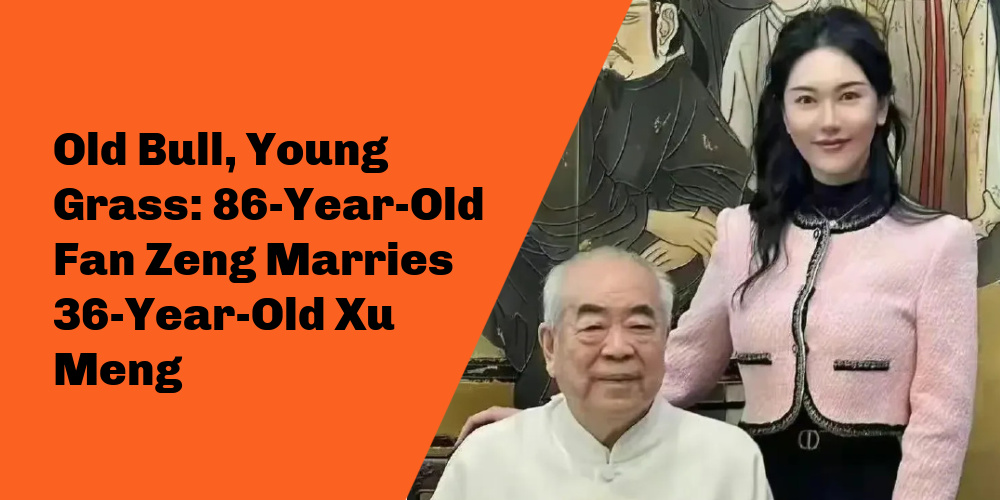
2: Unleashing Flood of Stories | The recent marriage announcement of the renowned Chinese calligrapher/painter Fan Zeng and Xu Meng, a Beijing TV presenter 50 years his junior, has sparked online discussions about the life and work of the esteemed Chinese artist. Some netizens think Fan lacks the integrity expected of a Chinese scholar-artist.

3: Yellen’s Favorites | Earlier in April, Yellen concluded her second trip to Beijing within a year, and once again, it’s not her official talks but rather her choices in food and drink venues that are sparking discussion on social media. From Yunnan classics to fusion cuisine, these are Janet Yellen’s picks for dining and drinking in Beijing.
What More to Know
◼︎ 🌧️ Guangdong Floods | Flooding, landslides, power outages. It’s been a rough few days in Guangdong. From the provincial capital Guangzhou to smaller cities like Shaoguan, Zhaoqing, and Qingyuan, exceptionally heavy rainfall since April 18 has brought significant problems to various areas. At least 4 deaths have been reported, with 10 people still missing. More than 100,000 people have been evacuated. The regions hardest hit are along the Beijiang River, which flooded on April 21. This marks the second flood of the river this year, with the first occurring on April 7, marking the earliest date in the season since floods in major Chinese rivers began being numbered in 1998. As with previous floods, social media is used as a channel to warn people about the ongoing situation, with further rainfall expected. Meanwhile, state media are honoring rescue workers as local heroes, or ‘those going against the tide’ (nìxíngzhě 逆行者).
◼︎ 🌋 Ijen Crater Death | A 31-year-old Chinese tourist tragically lost her life after falling from the edge of Indonesia’s Ijen volcano while attempting to take a photo. She tripped over her own long skirt, plummeting from a height of 75 meters early on the morning of April 20, while the tourists were there to witness the sunrise. With the May 1st holiday approaching, Chinese authorities, through social media, are using this incident as a cautionary tale to warn tourists of the hazards of prioritizing that ‘perfect social media photo’ over personal safety.
◼︎ 💀 Another University Poisoning Case | One recurring case that surfaces on Weibo is that of Zhu Ling, the female victim in the notorious 1995 thallium poisoning incident at Beijing’s Tsinghua University. Although Zhu Ling survived, she was left paralyzed and reliant on her parents for care for the rest of her life. The case remains unsolved, with many pointing to her roommate as the primary suspect. Now, a new suspected poisoning incident at a university has gained attention, following the death of a 25-year-old male student at Xiangtan University due to organ failure after seeking medical treatment. His 27-year-old roommate is currently under suspicion and has been detained. This is a case that is likely to draw further scrutiny in the time to come.
◼︎ 🏃♂️ Marathon Controversy | There was something fishy about the conclusion of the Beijing Half Marathon and the four runners at the finish line. In a video clip that went viral on Chinese social media (see here), viewers observed that three African runners seemed to intentionally slow down to allow Chinese competitor He Jie (何杰) to win the gold medal. Now, the Beijing Half Marathon Organizing Committee has announced the disqualification of all four runners for “breaching the rules of the competition,” nullifying their results, and reclaiming their trophies and medals. The Chinese Athletics Association has also introduced new regulations for discipline management in national events. It appears that the three African runners were “pace setters” who were not intended to be competing athletes, and sponsor/partner Xtep (特步), a sports equipment company, was responsible for not properly identifying them. Consequently, the company has been terminated as a partner. Marathon fraud and the importance of properly regulating major sports events has become a recurring topic on Chinese social media. Last October, the Chinese Athletics Association issued an emergency notice to standardize and regulate China’s national marathon and running events more effectively after Chinese marathon runner Yin Shunjin appeared to be intentionally obstructed by a support vehicle, forcing him to navigate around it and costing him valuable time in the crucial final two minutes of the marathon.
◼︎ 🎲 Little Tuan Tuan Goes to Jail | Popular Chinese influencer “Little Tuan Tuan” (一条小团团), who has millions of followers on the Douyu livestreaming app, became a top trending topic on Chinese social media on April 23 after news came out that she had been arrested. The famous game livestreamer had already stopped airing since last month, but it only now became known that she is suspected of engaging in large-scale illegal gambling activities. In late 2023, Douyu’s chairman and CEO Chen Shaojie was also arrested for allegedly hosting online gambling, which is illegal in mainland China. At the time, state media already reported that the arrest of Chen may lead to a group of top game anchors being implicated due to their involvement in gambling and money laundering. After the earlier arrest of four other anchors, Tuan Tuan is the latest livestream host to be arrested, signaling a zero tolerance approach towards gambling activities in China’s game-focused livestreaming world. Little Tuan Tuan could face up to five years in prison.
What’s the Drama

Best Choice Ever (Chéng Huān Jì 承欢记) is the latest Chinese TV drama hit. Produced by CCTV and simultaneously broadcasted on CCTV-8 and Tencent, it premiered on April 9, and some are already calling it the best romcom drama of the year. This urban family/romance drama centers around the story of Mai Chenghuan (麦承欢), a post-95 young woman living in Shanghai, who is preparing to marry her boyfriend Xin Jialiang (辛家亮), who comes from a wealthy family. However, when Chenghuan’s mum is doing all she can to meddle in their relationship, Mai Chenghuan must break free from her mother’s overbearing influence and focus on her own personal growth.
Noteworthy:
▶️ This drama is based on a book by the same name by Hong Kong writer Yi Shu or Isabel Nee Yeh-su, who is known for the strong, intelligent female characters in her stories.
▶️ The main protagonist is played by the super popular Chinese actress Yang Zi (杨紫), who previously starred in hit series such as Ode to Joy (欢乐颂) and The Oath of Love (余生).
▶️ This series is also airing in Thailand starting from April 29, but you won’t hear Yang Zi speaking Chinese there; the entire show will be dubbed in Thai.
▶️ The Shanghai Culture and Tourism office has also been involved in this production, that features some pretty scenes from around Shanghai, which is drawing in young visitors wanting to visit film locations like the Zhapu Road Bridge and Huaihuai Mansion.
You can watch Best Choice Ever online here (with English subtitles) via YouTube.
What’s Noteworthy

A short dress sold by Zara has gone viral in China for looking like the aprons used by the popular Chinese hotpot chain Haidilao. “I really thought it was a Zara x Haidialo collab,” some customers commented. Others also agree that the first thing they thought about when seeing the Zara dress was the Haidilao apron.
What’s Popular

Dutch DJ Martin Garrix found himself embroiled in controversy following the first F1 China Grand Prix Music Festival in Shanghai, which took place from Friday to Sunday. Garrix was allegedly supposed to perform together with Chinese singer Huang Zitao (黄子韬), who initially complained via livestream that the DJ did not show up to their joint rehearsal, and then claimed the DJ showed disrespect by performing his song without him being present on stage. On Weibo, one hashtag about the incident attracted over 160 million views.
Both Huang and Garrix are popular on Weibo, where the Chinese singer has over 66 million fans while the Dutch DJ has more than 360,000 followers.
In response, Garrix promptly posted a video on Weibo refuting what he called “misinformation and lies,” asserting that he and Huang Zitao were never scheduled to perform together. Hearing about Huang’s complaints, he still invited him up on stage, but he never showed up (Garrix claimed he was hiding in the bathroom). Following this, the event organizers issued an apology for the confusion.
Online, opinions remain divided, with some defending Garrix and labeling Huang a “crybaby,” while others support Huang, arguing that Garrix was rude for not wanting to share the stage with the Chinese singer. Either way, it seems the two performers won’t be sharing a beer, nor a stage, anytime soon.
What’s Memorable

This pick from our archive – in light of the current floods – revisits the flood of three years ago. The social media trends during China’s heavy rainfall and floods in Henan in July of 2021 show the multidimensionality of online communication in times of disaster. Facing the devastating downpours, Weibo became a site for participation, propaganda, and some controversial profiting.👇
Weibo Word of the Week

“Coffin Room” | Our Weibo Word of the Week is “Coffin Room” (guāncái fáng 棺材房), or even “Mini Coffin Room” (mínǐ guāncái fáng 迷你棺材房), referring to extremely tiny spaces being rented out at rooms.
The term “coffin room” isn’t new; it previously appeared in mainstream media to describe small cubicles rented out in Hong Kong to people who couldn’t afford larger spaces in the exorbitantly expensive housing market. However, it has recently resurfaced on Chinese social media to describe similarly cramped spaces in Shanghai.
One viral video showcased a rental room of about 5m² (approximately 53.82 square feet) with a makeshift sleeping space right behind a toilet, measuring about two meters long and one meter wide (approximately 6.56 feet long and 3.28 feet wide), all for a monthly rent of 300 yuan ($41). This so-called “coffin room” sparked controversy, with many deeming it absurd and a testament to Shanghai’s overheated housing market. However, the landlord mentioned that the room was already rented out to a Didi driver the day it was posted. See video here.
This is an on-site version of the Weibo Watch newsletter by What’s on Weibo. Missed last week’s newsletter? Find it here. If you are already subscribed to What’s on Weibo but are not yet receiving this newsletter in your inbox, please contact us directly to let us know.
Popular Reads
-

 China Insight2 weeks ago
China Insight2 weeks agoThe Tragic Story of “Fat Cat”: How a Chinese Gamer’s Suicide Went Viral
-

 China Music2 months ago
China Music2 months agoThe Chinese Viral TikTok Song Explained (No, It’s Not About Samsung)
-

 China Insight2 months ago
China Insight2 months agoThe ‘Two Sessions’ Suggestions: Six Proposals Raising Online Discussions
-

 China Arts & Entertainment1 month ago
China Arts & Entertainment1 month ago“Old Bull Eating Young Grass”: 86-Year-Old Chinese Painter Fan Zeng Marries 36-Year-Old Xu Meng






